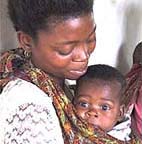|
||||

|
|
||||||||
|
May 2000 Return to May 2000 contents page NEWS Countries tell GAVI they mean business LESS than four short months since the launch of the Alliance, more than 50 countries have signed up to participate in its initiative. From Kyrgyzstan to Cambodia and Cuba to Côte d’Ivoire, governments have sent GAVI an emphatic message: they are committed to wider immunization and determined to deliver it. But, like GAVI’s partners, they warn that the initiative needs sustained investment to succeed.
Part of the Vaccine Fund is to be spent on newer vaccines such as those against hepatitis B and yellow fever, which many governments are keen to introduce. "We are confident that Ghana has the capacity to deliver the newer vaccines now," says Dr Jama Gulaid, head of the health programme at UNICEF in Accra. Likewise, Cambodia’s health ministry has told GAVI that it could introduce hepatitis B vaccine into its programme "as soon as late 2000... if resources become available". No one is complacent about the challenges ahead, however. Ciro de Quadros, Director of the Division of Vaccines and Immunization at the Pan American Health Organization, warns that more donors to the Vaccine Fund are needed if the effort is to be sustained beyond 2005, and that countries need support to improve their systems for delivering vaccines. Support for infrastructure is part of GAVI’s plans. The Alliance announced last month that it needed $200 million more per year, on top of the $150 million per year already pledged to the Vaccine Fund, to halve the number of un-immunized children in poor countries by 2005. For more information see the Report of the Second Board Meeting at www.VaccineAlliance.org/reference/ 2nd.mtg.rept.pdf
Return to May 2000 contents page
|
||||||||
| Contact GAVI | Guestbook | Text version | Credits and Copyright
|
||||||||
